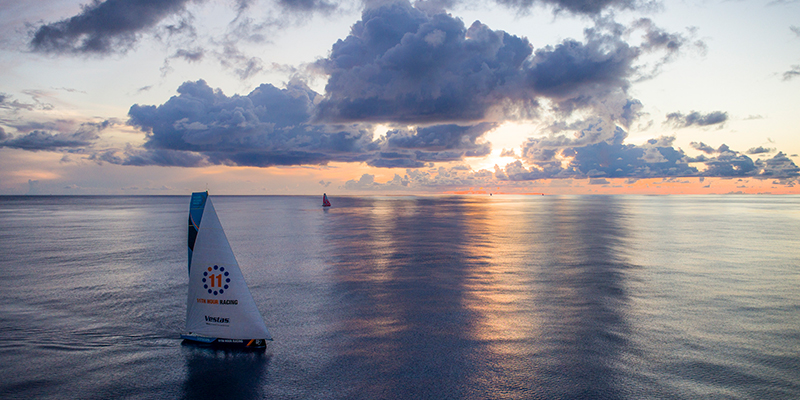
Leading Sustainability
Vestas 11th Hour Racing Leading Sustainability on and off the water
When Vestas 11th Hour Racing set off to race around the world, they also set off on a mission to be the most sustainable team to ever compete in the Volvo Ocean Race, backed by the support of its two co-title partners Vestas and 11th Hour Racing. ‘Leading Sustainability,’ the team’s summary video of its efforts to accomplish this goal, reveals what it takes to incorporate sustainability into every aspect of a professional sports team, how this shared mission brought the team together, and how they addressed sustainability in the face of adversity.
Some key sustainability accomplishments of Vestas 11th Hour Racing in the 2017-18 Volvo Ocean Race:
- The team calculated and offset its carbon footprint of 1218 tonnes of CO2 emitted. The offset will be carried out through Seagrass Grow, a program of The Ocean Foundation. It is estimated that seagrass is up to 35x more effective than Amazonian rainforests in their carbon uptake and storage abilities. Vestas 11th Hour Racing is the first Volvo Ocean Race team to track and offset their carbon footprint.
- Through its legacy project with 11th Hour Racing, the team awarded $120,000 in grant funding to local environmental organizations ($10,000 at each stopover) to support and raise awareness to the incredible efforts happening worldwide to restore ocean health. (See Route Map below with names of organizations).
- By adopting Meatless Mondays, the team reduced its carbon footprint by 2.72 tonnes and prevented the use of 671,000 liters of water. These actions not only helped the team reduce its water usage and carbon footprint, but it helped them raise awareness of this global movement. In fact, if you eat just one less burger per week, over the course of a year, it’s the same as driving 320 miles less in your car.
- 92% of the team’s accommodations were within walking, biking, or public transport distance from the race villages. This careful planning enabled the team to reduce their reliance on cars and taxis as well as their overall carbon footprint.
- 99,300 people visited the public Exploration Zone in the team base, learning about renewable energy, ocean science, the circular economy, and microplastic pollution. Additionally, over 550,000 people viewed the team’s sustainability-focused videos on social media.
- The team was able to achieve a 74% diversion rate (62% recycling 13% composting) meaning that only 26% of its waste went to the landfill. By comparison, according to the World Economic Forum, Germany has the highest recycling rate in the world at 56%.
- The team removed 212 kilos of trash from beaches. Combined with the 2.1 tons of abandoned fishing gear that will be removed from the ocean by 11th Hour Racing’s grantee Healthy Seas, the team will compensate for the waste they sent to landfill, and for the rig and sails lost overboard during their dismasting in the Southern Ocean.
“When we started this campaign, we knew we wanted to bring attention to important ocean health issues such as plastic pollution and climate change,” said Charlie Enright, Skipper, Vestas 11th Hour Racing. “I’m proud to say that not only did we raise awareness on these issues, but we also walked the talk, paying close attention to our environmental footprint and compensating for both our carbon and waste footprint where we could not eliminate or reduce,” added Mark Towill, Team Director, Vestas 11th Hour Racing.
In addition to some of the results listed above, the team followed an Environmental Purchasing Plan for food and team operations. The team’s suppliers were selected to align with its sustainability goals: Karün sunglasses made from recycled fishing nets, Aethic reef compatible sunscreen, Bluewater filtration and refill stations that deliver the world’s most effective water cleaning technology. The team also worked with official sailing gear supplier Musto to eliminate 70% of its plastic packaging. In September, Vestas 11th Hour Racing will release a full report detailing its sustainability efforts and accomplishments during the 2017-18 Volvo Ocean Race.

Header image credit: Amory Ross | Volvo AB